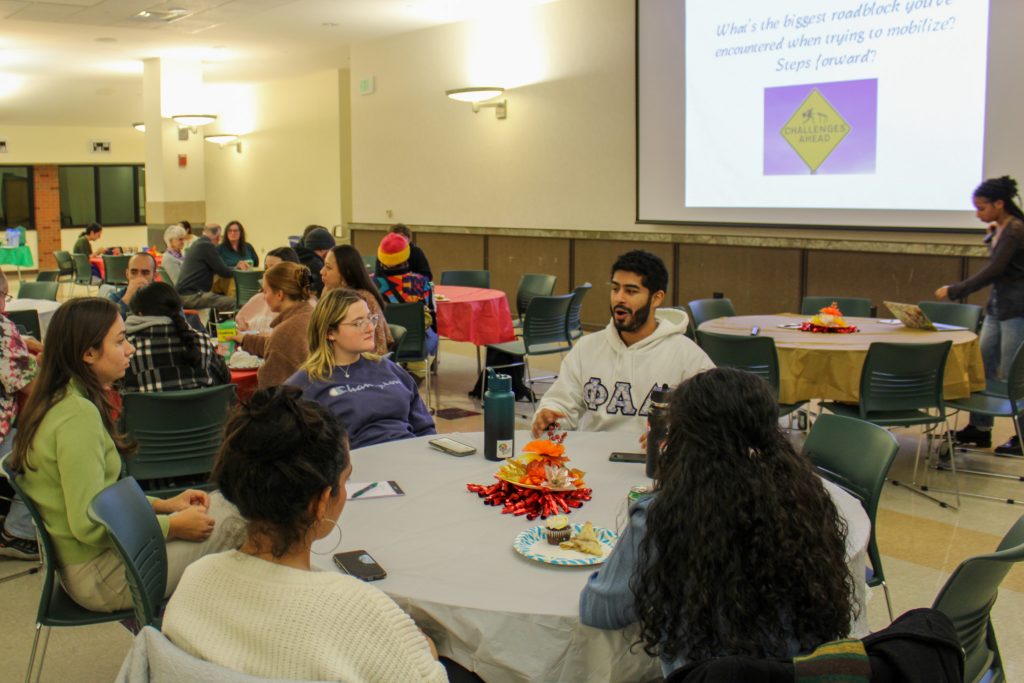On the weekend before Thanksgiving, local social justice-oriented organizations came together to eat food and discuss ideas at “Solidarity for the Future.”
Hosted by the Poverty Awareness Coalition (PAC) and the Roosevelt Network, the event involved multiple organizations, including Justice and Unity for the Southern Tier (JUST), the Binghamton Food Rescue (BFR) and the Binghamton chapter of the New York Public Interest Research Group (NYPIRG). Participating organizations, students and community members each paid seven dollars to attend the networking event, with all proceeds going to the North of Main (NoMa) community center. Participants gathered in Old Union Hall to share a meal at roundtables and hold discussions surrounding intersectional goals, roadblocks and challenges to the negative views of the Binghamton community.
Discussions were facilitated through a PowerPoint by Gracie Henderson, inclusion officer for the Roosevelt Network, member of the PAC and a senior majoring in philosophy, politics and law. Henderson described how a major goal of the evening was to connect the progressive policy of the Roosevelt Network with the direct action of PAC, especially after her experience volunteering at the NoMa community center.
“I was trying to find a way to connect these two [organizations] that do the systemic stuff and the day-to-day but are student oriented and off-campus,” Henderson said. “I just wanted to make a space where we try to develop those networks and try to make sustaining relationships.”
Joshua Samuel, vice president of the Roosevelt Network, president of BU’s NYPIRG and a senior majoring in philosophy, politics and law, was hopeful in the planning of this event as he supported Henderson. According to Samuel, every progressive organization has amazing goals, but are scattered throughout Binghamton with many of them not knowing about one another.
“We’ll find out about one or two [organizations] in your college career but not about all the other ones trying to do things,” Samuel said. “Communicating with each other, not even on-campus but also off-campus, understanding what we’re doing, when we’re doing events, how we can support. It changes the movement from 10 to 15 people to hundreds of people and that’s really how you make a change.”
Throughout Henderson’s presentation, attendees were made aware of all of the social justice organizations around campus, which make up 21 groups, including Habitat for Humanity, Zero Hour and Team Sunrise.
Debbie Thorpe, 72, attended the event and found this element of the presentation to be helpful and informative. Thorpe volunteers at her church, All Saints Episcopal Church on 475 Main St. in Johnson City, which hosts a Soup and Sandwich Saturday that offers free meals from 12 p.m. to 1 p.m.
“When they put up that board with all the different organizations, I didn’t know what half of them were,” Thorpe said. “And I think that’s part of the problem — communication is about what and who can collaborate together because we’re all fighting for the same dollar and if we fight together we might have a better chance.”
Proceeds from Solidarity for the Future went to the NoMA community center located on 85 Walnut St., an institution that represents the perfect image of using an intersectional approach, according to Henderson. Henderson listed multiple events the center does with other organizations, such as free yoga and fitness classes from the Lourdes ACEs program and a Binghamton Food Rescue food drive every Saturday.
Brandy Brown, 43, a community center coordinator with NoMA, makes sure every program runs smoothly, runs the social media and performs outreach. Brown shared that the center’s purpose is to be a community resource by providing help like offering two community meals a week, a free clothing closet, art programs and more.
“We just want to be an all-around resource for the community, an open door and if people just need someone to talk to obviously, I like to talk,” Brown said.
According to Samuel, the event set up a foundation for future advocacy.
“Going forward my goal is to help [Henderson] organize people’s contact information so that we can have a large and robust group chat where we can help each other out as organizations,” Samuel said. “Getting more and more [organizations] to come and having them speak to each other face to face is amazing and I’m very happy with how it went.”



